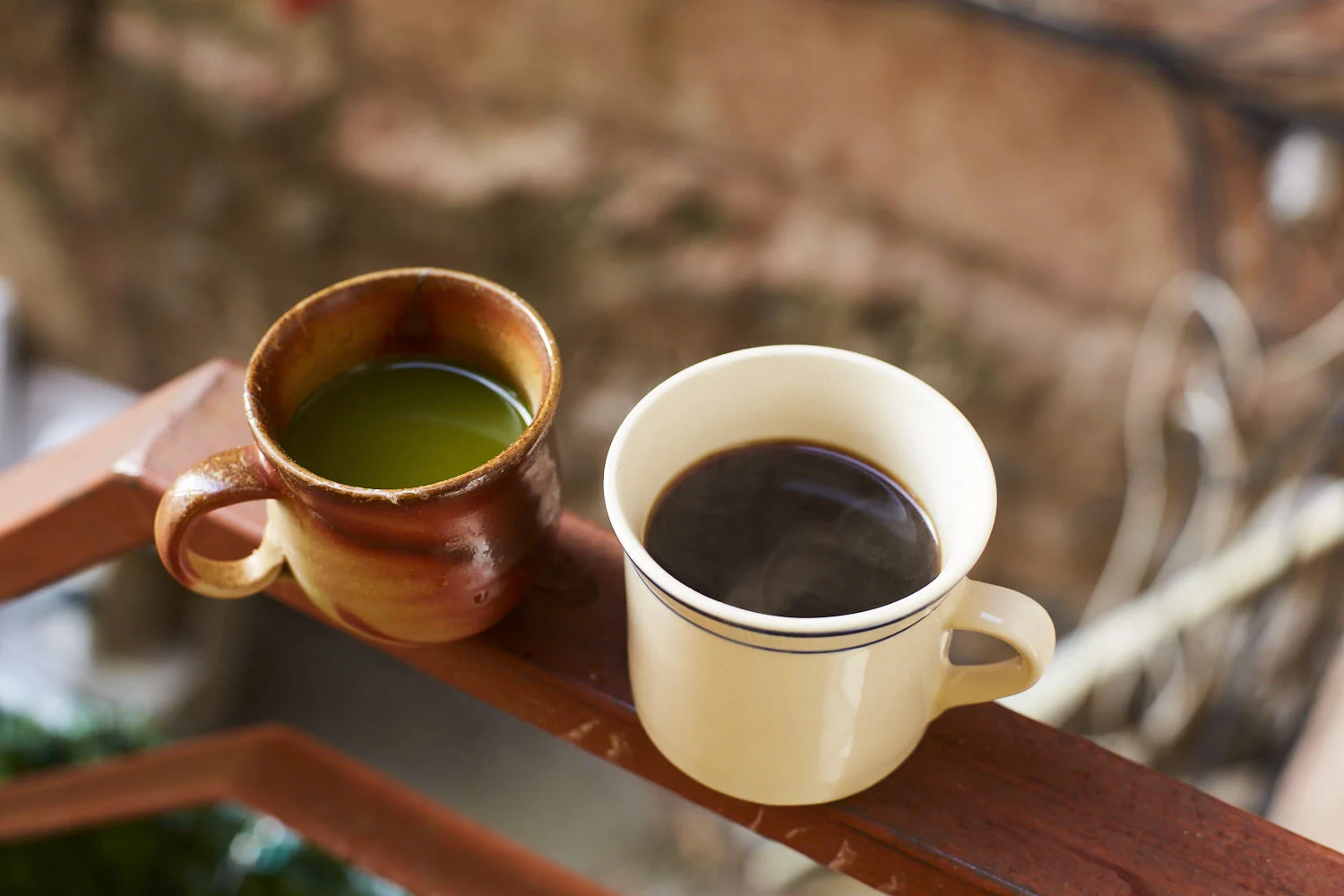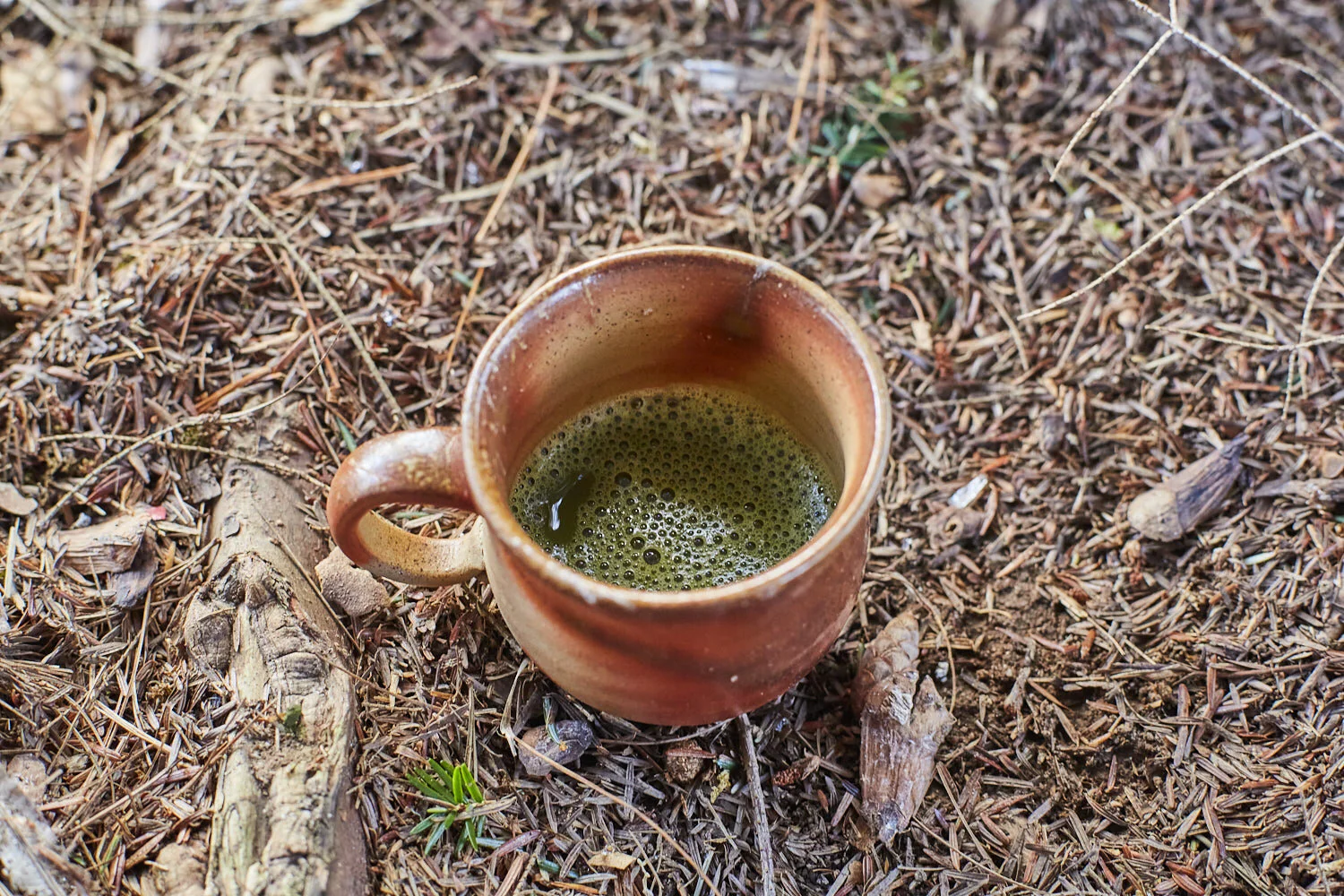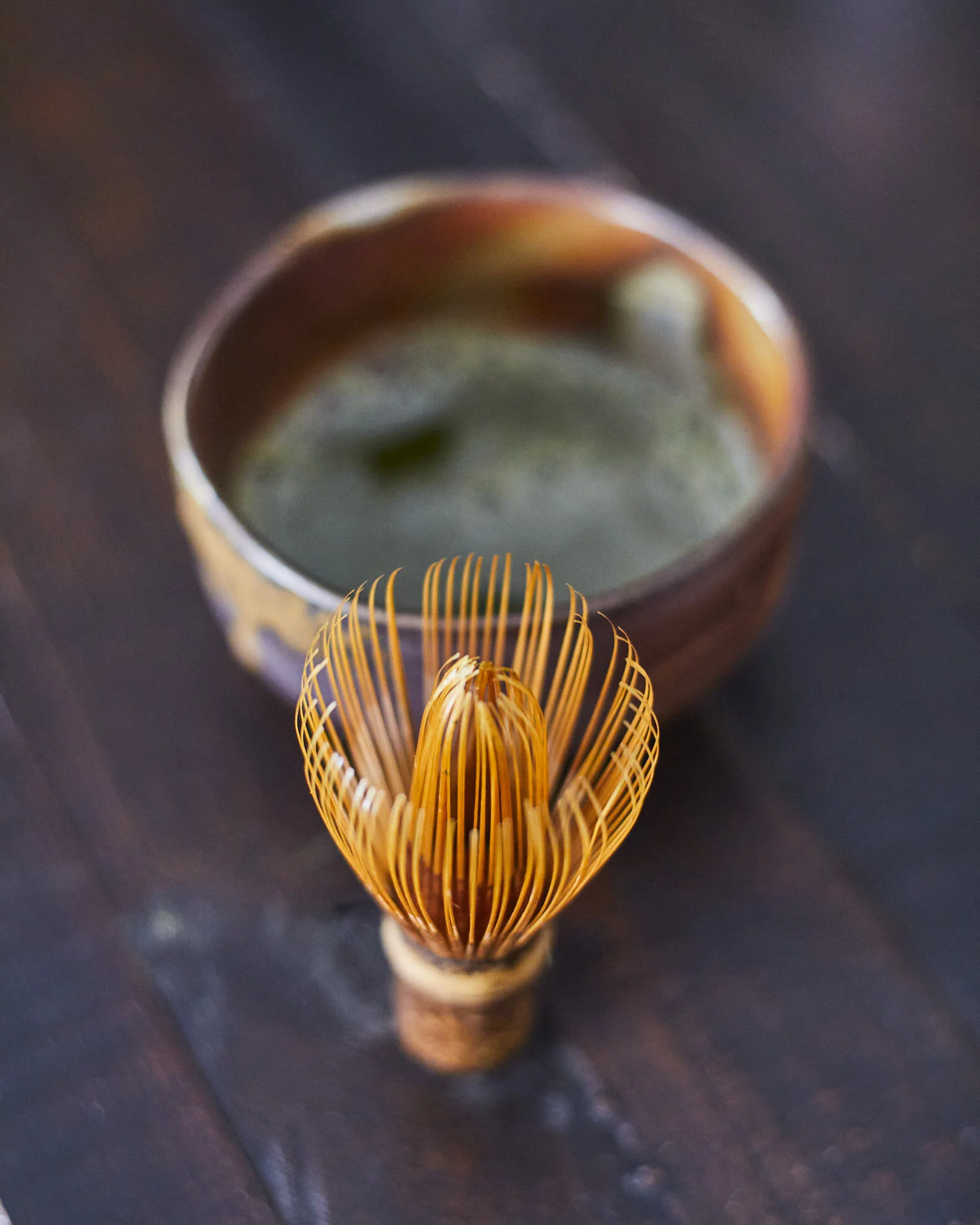Why Matcha is WAY Better Than Coffee
In this article, I’m putting the two caffeine-packed favorites head to head – coffee and Matcha green tea. You’ve probably heard that Matcha is packed with health benefits and that’s a popular (and healthier) alternative to coffee.
We’ll go over exactly why it is, and we’ll compare their health benefits, caffeine hit, other daily effects, and coffee and Matcha – plus so much more. You’ll see exactly why I think it’s so much better than coffee! Grab a cup of Matcha and let’s get sippin.
Extra info: By the way, I wrote an entire article on all the differences in Matcha VS Coffee here. (You will see that Matcha wins by a long shot.)
What is Matcha?
Before we go further, I wanna go over some quick details about Matcha (in case it’s new to you). Matcha is a stone-ground Green tea powder from Japan that is whisked into hot water before being consumed. The tiny powdered tea leaves are suspended in the hot water.
And because you consume the tea leaf itself (as opposed to drinking a steep), you get a ton of additional health benefits… But we’ll get to that later.
If Matcha is new to you, be sure to check out our guide What is Matcha Tea? here, that goes over everything you need to know about Matcha green tea – and why you should consider making it part of your morning ritual or your go-to energy boost!
Basically, the important things to know are:
It's from Japan
It's stone-ground
It's whisked
The powdered leaf is suspended in water (so you consume the whole leaf and not a brew)
And it has a vegetal (green, earthy) taste with a nice balanced sweetness
Now that we’ve got some of the basics about Matcha out of the way, let’s dive in.
Caffeine Kick
Both Matcha and coffee are known for being caffeine powerhouses. But they punch much differently...
Caffeine in Coffee
The caffeine content of a typical 8oz cup of coffee contains is about 95mg and hits pretty strongly. That’s why everyone reaches for it in the morning or when they need to stay awake.
But there's a catch… The caffeine high can lead to an annoying crash and even some caffeine withdrawal headaches.
Caffeine in Matcha
The caffeine content of a typical 8oz cup of Matcha is about 70mg. While the caffeine hit is less than coffee, it's still pretty significant. Matcha contains about twice as much caffeine as a typical cup of Green tea, so it gets the job done.
But there's a reason it hits differently. It contains a cool amino acid that counters some of the bad parts of caffeine…
Extra info: If you want to learn why all tea (and especially Matcha) has caffeine, and how it differs from coffee, I invite you to read our detailed article on the topic: Yes, Matcha Tea has caffeine and Here is Why.
L-theanine
Matcha green tea also contains L-theanine, an amino acid that makes you feel a bit relaxed. Why is this important? It explains why Matcha’s caffeine hits a little differently. This amino acid is also responsible for the “savory” taste present in many Japanese teas.
When caffeine, which is a stimulant, mixes with L-theanine, the jolt you might feel from drinking is a bit more focused. And you won’t usually feel the same kind of crash you would after drinking a cup of coffee. The stimulation feels cleaner and you feel much more alert.
This is why monks in Japan and China have long used tea as part of their meditation practices. The stimulating caffeine allows for long meditations, while the L-theanine allows for a relaxed feeling.
So, If you’re trying to get your day started, some work done, or you just need a little energy boost in the afternoon, Matcha is a way better choice than coffee. It’ll wake you up, but it’s not gonna drop you the way coffee does. It can even lead to a really interesting feeling known as "tea drunk" (the mixing of the caffeine and L-theanine leads to a feeling of euphoria).
Health Benefits
Both Matcha and coffee are known to have some powerful health benefits. But these two beverages are pretty different when it comes to daily consumption and health.
But remember, I’m a tea nerd, not a doctor... So if you have real questions about the health benefits I’m looking at, consult a trained medical professional.
Health Benefits of Coffee
Coffee is known for its caffeine content. But it’s also rich in polyphenols (which are health-promoting compounds also found in tea). Polyphenols are known to have many positive effects on the body, especially with fighting or preventing cancer.
Additionally, coffee contains high levels of vitamin B2 and Magnesium. Vitamin B2 (also known as riboflavin) helps enzymes that control the growth of cells, energy production, and the breakdown of fats in the body. Magnesium is a mineral that also plays an important part in helping enzymes in the body carry out essential functions. In short: coffee isn’t all bad.
Health Benefits of Matcha
Matcha is PACKED with health benefits. But a lot of this has to do with the fact that you’re consuming the tea leaf that’s suspended in water. Unlike coffee or most tea, Matcha is powdered and whisked into hot water, so it’s not a brew or extraction (for that, think tea bag or loose leaf tea).
And because of this difference and the fact that you're consuming the leaf, you get even more of the health benefits associated with tea. Making Matcha automatically super unique. So what are some of the benefits of drinking a cup of Matcha? Let’s go over them one by one.
Antioxidants
Like coffee, Matcha is full of polyphenols, which are health-promoting compounds also known as antioxidants. Matcha contains a significant amount of these. Again, this stems from the fact that you’re consuming the actual leaf, not just a brew (which most teas and coffee are).
Of all the kinds of tea that exist, Matcha has been shown to contain the highest levels of antioxidant potential. Put simply, Matcha has the most antioxidants available for the body to absorb. Because of these high levels of available antioxidants, Matcha is one of the healthiest teas and a much healthier alternative to coffee.
Stress Reduction
Matcha has also been shown to help with stress reduction. The L-theanine in the tea leaves produces calm and focused attention in the body. So even with high levels of caffeine, Matcha may help with overall anxiety and stress.
According to one study, anxiety, depression, and sleep-related problems decreased significantly with the addition of a theanine supplement. Drinking tea (and especially Matcha) will be a much different experience than a cup of coffee.
Brain Function
Theanine amino acids in tea may also increase the activity of certain chemicals in the brain which can lead to better brain function and overall stress relief. It's even been shown to increase alpha waves in the brain, which are associated with higher levels of creativity, relaxation, and mental alertness – much like meditation.
Heart Health
One of the most fascinating potential health benefits of Matcha consumption is the positive effects it may have on heart health and heart disease. One study suggests that tea catechins may have a direct effect on vascular functions and vascular health which can lower blood pressure. And one article published by Harvard Medical School suggests that Green tea consumption may even lower your risk of heart disease.
More generally, the consumption of Green tea has been shown to lower LDL cholesterol (the bad kind!). Green tea catechins may even help increase the metabolism of fats in the body which helps with weight loss.
Bad Breath
Another cool benefit of the catechins (health-promoting compounds) in Matcha is that they have strong antibacterial potential. Which is bad news for the bacteria that live in your mouth, but great for bad breath! ;)
Matcha is pretty great for your teeth and oral hygiene in general. We wrote a separate article about the topic if you are interested: 5 Reasons Why Matcha is Great for your Teeth.
Skin
Catechins and polyphenols (again, just fancy words for health-promoting compounds) in Matcha green teas have potent antibacterial functions, as well as powerful effects at the cellular level. The catechin EGCG found in abundance in Matcha is especially beneficial for your skin. It has anti-inflammatory properties that help prevent the inflammation and growth of acne.
More specifically, GTPP (which is a polyphenol found in Matcha) has been shown to increase protection against extended UV damage to the skin. So generally speaking, the antibacterial and anti-inflammatory properties of tea help keep the body and skin healthy.
Daily Drinking Effects
Effects of Coffee Drinking
We’re all aware of some of the not-so-pleasant effects of drinking coffee. I’m talking about:
The jitter
The dependency
The withdrawal headaches
None of that is fun! The effects aren’t all bad… But I think you get the picture. What if I told you that there was a drink that had all of the good aspects of a cup of coffee – the caffeine perk, good flavor, history, culture, AND added health benefits?
Well… That’s where Matcha green tea takes the stage.
Effects of Matcha Drinking
Matcha just hits differently. It affects your system much more subtly than a cup of coffee does. And by that, I mean the effects are felt in less harsh ways.
Even though you’re consuming a significant amount of caffeine, l-theanine (an amino acid in all tea) balances the jolt with a mellow feeling, which causes you to feel more alert and focused. And you don’t crash the same way you might with coffee. (This is why tea is the drink of choice for monks)
Even better… Matcha has a high chlorophyll content. And you’re consuming decent amounts of antioxidants. Both of which are great for the body!
The Final Pour – is Matcha Better than Coffee?
As you can see, Matcha is a pretty awesome drink–well worth becoming part of your morning ritual. So… Is Matcha better than coffee? The answer is YES!
Not only is it packed with antioxidants and other health benefits, but it also doesn’t hit your system the same way that a cup of coffee does. It provides many of the positive benefits that coffee does (including high caffeine levels) without the unwanted side effects of coffee– the crash, jitters, withdrawal headaches, or dependency.
So in short, it doesn't affect your energy levels in the same way! And to me, that makes Matcha a way better alternative to coffee. While I’m not telling you to switch sides or give up coffee consumption, I do think Matcha green tea is worth checking out and drinking more of.
Coffee Drinkers – don't believe me? Try out our authentic, freshly ground Matcha here and tell me you're not convinced! And if you want to learn more about Matcha or tea in general, stop by our Steepers Union group on Facebook to connect with fellow tea lovers.
MORE ON MATCHA






